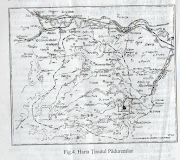In the date of 25th March in Ținutul Pădurenilor we celebrate the tradition Blagovestenia
A custom with a fixed date (March 25), Blagoveştenia retains the Slavonic name of the Annunciation. The symbol of this day was the bubbling (whirlwind), the fire and smoke resulting from the burning in piles of various kinds of garbage in the household. Two or three days before the holiday, the households collected straw remnants, leaves, thoriums, cradles left over from the leaves, after feeding the sheep, bean stalks, etc. which they set on fire before daybreak. Now it was clear which woman got up earlier in the morning. It was more smoke than fire. The children looked forward to seeing the flames in the yard play on the ceiling of the house when they were looking, and then, flying out, they began to jump over the piles burning and smoking, either for their own pleasure or at the urging of their parents, "to don't bite his snakes. " We notice that after the snake removal ritual, from the previous feast, of the snakes, we are now witnessing another one, for the prevention of snake bites.
The first in the family to wake up went out into the yard and set fire to the piles prepared in the evening. The whole village was covered in smoke. In some localities (Goleş, Mladini, Vălari) cattle were also driven through the smoke, both cows and sheep, so as not to be bitten by snakes during the summer.
At the same time, people were aware that the smoke destroyed the eggs of caterpillars nesting in the bark of trees. An immediate gain, however, was that, after this holiday, the precincts of the household became cleaner, with all the plant debris disappearing, which was no longer used.
Annunciation in the Christian Orthodox traditional and majority belief in in Ținutul Pădurenilor
The Annunciation (or Evangelismos in Greek) to the Theotokos is one of the Great Feasts of the Orthodox Church, celebrated on March 25.
According to the Gospel of Luke 1:26-38, the Archangel Gabriel appeared to Mary to announce to her that she would conceive and bear a son, even though she "knew no man." According to holy tradition Mary had come home to her parents when she was only fifteen when she was visited by Gabriel.
This date was selected by the Church Fathers to be exactly nine months ahead of the Nativity of Our Lord, indicating that Christ was conceived in perfection at that time "of the Holy Spirit and the Virgin Mary," as stated in the Nicene-Constantinopolitan Creed.
Many men and women in Greece are named for this event and celebrate their name day on this date.
Greek: Evangelia (f) and Evangelos (m)
English: Evangeline (f) and Evan and Angelo (m)
In Arabic traditions, the names Bechara, Beshara, or Bashar (all of which mean "good news") are used by men for whom this feast is also their name day.
Source Othowiki and Ținutul Pădurenilor Romania
























0 Comments